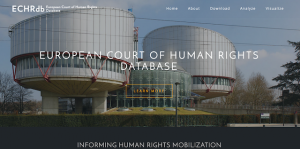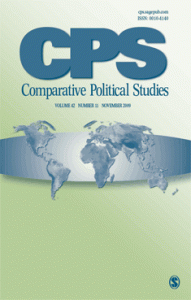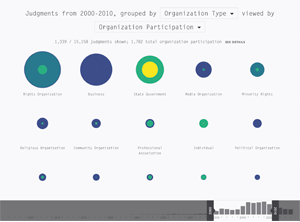My research agenda lies at the intersection of the fields of political science and socio-legal studies. I examine rights mobilization, international courts and global justice institutions with a geographic expertise in Europe. At the heart of this research agenda is a concern for transparency, accountability and accessibility in legal institutions and governance and a dedication to analyzing real world social justice problems. My research is characterized by a theoretical concern for processes of legal and social change and an empirical focus on the role of courts and mobilized non-state actors (non-governmental organizations, interest groups, civil society) in this dynamic. This research examines not only a diversity of salient legal domains from the environment to sex discrimination and immigrant rights, but also emphasizes the inequalities in access and rights protection that arise due to gender, ethnicity, and class.
RESEARCH INTERESTS
- Law and Politics: international law and organization; transnational legal mobilization; global justice; comparative constitutionalism; transnational activism and social movements
- Data and Methods: qualitative approaches to social science research methods and design; large n database construction and design; data sharing and visualization
- Area Expertise: human rights; global women’s rights; environmental protection and climate change; international criminal justice; European law and politics
CURRENT PROJECTS
Legal Mobilization and International Justice

Note: Database update in process. This multi-year research project is funded by the National Science Foundation (NSF SES # 1322161) and examines the effects of international courts on human rights and the roles that interest and advocacy organizations play in this process. The project includes a state of the art database, European Court of Human Rights Database (ECHRdb). The database includes over 21,000 judicial decisions from the European Court of Human Rights, 1960-2020. It is the first publicly accessible database to systematically detail international court judgment data, alongside interest and advocacy organization participation, and the effects on domestic and international law. It relies on cross-national, time series legal data, collected through case law analysis, elite interviews, and archival documents. The project develops an interactive website housing the ECHRdb featuring an online analysis tool, data visualizations, and downloadable data files. Users are able to analyze international court data and advocacy group mobilization in innovative ways, informing the future of human rights protection and enforcement.
R. Cichowski & E. Chrun (2017). European Court of Human Rights Database (ECHRdb), Version 1.0 Release December 2017.
Building Dynamic Research Communities in Global Legal Studies

This multi-year project is funded by the National Science Foundation (SES#1748180) and is a collaborative research grant with Dan Brinks at UT Austin (SES#1748131) and Jeff Staton at Emory University (SES#1748128). It seeks to develop a new model for collaborative and convergent research communities in law and social sciences. Collaboration is across field, method and geographic expertise and the communities are convergent in that they facilitate the merging of these diverse perspectives to produce innovation and understanding around a single deep scientific question or pressing societal need in the field of comparative and international law. There are three components to the research communities: data infrastructure, idea labs and workshops and the Global Law & Politics Network. This project is supported by the National Science Foundation under Grant Number 1748180.
PUBLICATIONS
Books and Edited Volumes/Issues

The European Court and Civil Society: Litigation Mobilization and Governance. Cambridge University Press, 2007. Winner: Best Book Award (American Political Science Association, European Politics & Society Section)

Courts, Democracy and Governance.
Special Issue of Comparative Political Studies, 39 (1). 2006.
(Editor)

Law, Politics and Society: State of the European Union.
Oxford University Press, 2003.
(Co-ed. T. Börzel)
Peer Reviewed Journal Articles and Chapters in Edited Volumes
- The ECHRdb: An Integrative Approach to Collecting and Sharing Data on International Courts. In D. Kapiszewski & M. Ingram, eds. Data & Methods in the Comparative Study of Legal Institutions. Forthcoming. New York, NY: Cambridge University Press (reviewed, in process).
- Data Infrastructure Innovation in the Field of Law & Courts: The European Court of Human Rights Database (ECHRdb). In S. Sterett & L. Walker, eds. Research Handbook: Law & Courts. 2019. Northampton, MA: Elgar Publishing
- The European Court of Human Rights, Amicus Curiae and Violence against Women. Law & Society Review, 2016, 50 (4). 890-919.
- Mobilization, Litigation and Democratic Governance. Representation: Journal of Representative Democracy, 2013, 49(3): 321-332.
- Legal Mobilization, Transnational Activism and Gender Equality in the EU. Canadian Journal of Law and Society, 2013, 28(2): 209-227.
- Courts, Advocacy Groups and Human Rights in Europe. In A. Brysk, ed. The Politics of the Globalization of Law. 2013. New York, NY: Routledge.
- Courts, Democracy and Governance. Comparative Political Studies, 2006, 39: 3-21.
- Courts, Rights and Democratic Participation. Comparative Political Studies, 2006, 39: 50-75.
- Women’s Rights, the European Court and Supranational Constitutionalism. Law & Society Review, 2004, 38: 489-512.
- Western Dreams, Eastern Realities: Citizen Support for the European Union in Central and Eastern Europe. Comparative Political Studies, 2000, 33: 1243-1278.
- Gender and Policy in Comparative Perspective. Women & Politics, Spring, 2000, 21(1): 107-115.
- Integrating the Environment: The European Court and the Construction of Supranational Policy. Journal of European Public Policy, 1998, 5: 387-405.
- Judicial Politics, Gender and the Courts. In G. Waylen, K. Celis, J. Kantola and L. Weldon, eds. The Oxford Handbook of Gender and Politics. 2013. Oxford, UK: Oxford University Press.
- Civil Society and the European Court of Human Rights. In M. Madsen and J. Christoffersen, eds. The European Court of Human Rights between Law and Politics. 2011. Oxford, UK: Oxford University Press.
- Women’s Rights and Supranational Constitutionalism. In J. Goldstein and R. Steinberg, eds., International Institutions. 2010. Thousand Oaks, CA: Sage Publications.(reprint in International Relations series of “most influential and field defining articles”).
- Sex Equality. In A. Stone Sweet, The Judicial Construction of Europe. 2004. Oxford: Oxford University Press. (with A. Stone Sweet)
- Participation, Representative Democracy and the Courts. In R. Dalton, B. Cain and S. Scarrow, eds. New Forms of Democracy? Reform and Transformation of Democratic Institutions. Oxford: Oxford University Press, pp. 192-220. (principal author, co-authored with A. Stone Sweet).
- Law, Politics and Society in Europe. In T. Börzel and R. Cichowski, eds. State of the European Union: Law, Politics and Society. 2003. Oxford: Oxford University Press, pp. 1-17. (lead author, co-authored with Börzel).
- ‘No Discrimination Whatsoever:’ Women’s Transnational Activism and the Evolution of European Sex Equality Policy. In N. Naples and A. Desai, eds., Women’s Community Activism and Globalization. 2002. New York: Routledge, pp.220-238.
- Judicial Rulemaking and the Institutionalization of EU Sex Equality Policy. In A. Stone Sweet, W. Sandholtz, and N. Fligstein eds., The Institutionalization of Europe. 2001. Oxford: Oxford University Press, pp.113-136.
